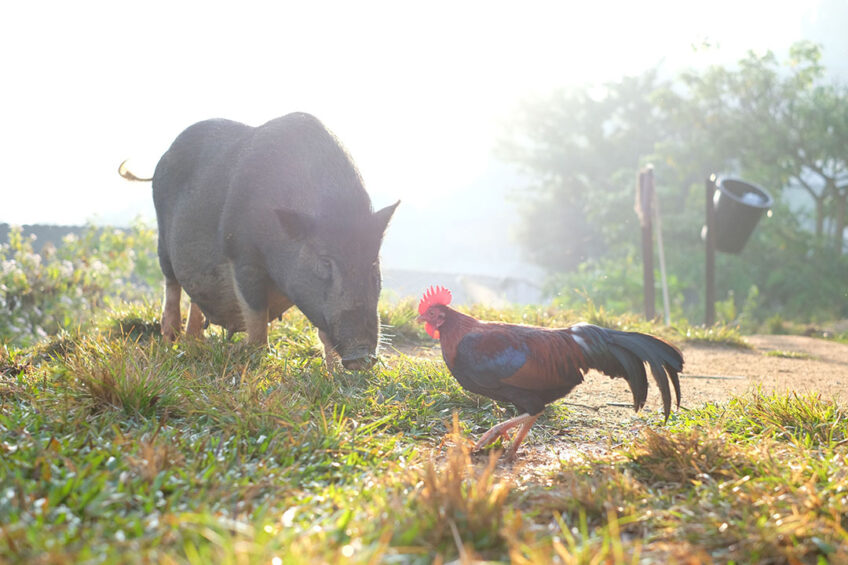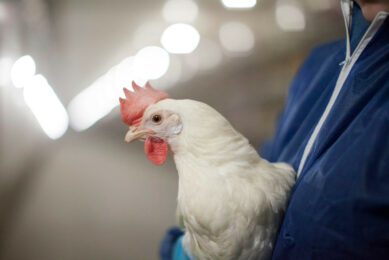Overcoming issues of β-mannans in pig and poultry rations

Scientists believe β-mannanase supplements in pig and poultry rations can improve digestibility and therefore add usable energy to feed.
Researchers at the Scottish Rural College (SRUC) say β-mannans, which are non-digestible carbohydrates present in relatively high volumes in many feedstuffs used in protein sources for UK pig and poultry diets, can evoke unnecessary immune responses.
These Feed Induced Immune Responses (FIIR) occur because the β-mannans get stuck in the epithelial gut wall as they are too large to get absorbed, causing the immune system t to recognise them as a pathogen challenge.
The consequences of improved feed efficiency are that less feed is required for the same amount of output

Triggers fake immune response
Professor Jos Houdijk, head of SRUC’s Monogastric Science Research Centre, said this initiates a cascade of events, including immunopathological ones, which result in energy being diverted away from production for an immune response that isn’t needed.
“This FIIR results in resources being diverted away from production. It therefore leads to reduced feed efficiency, also observed as an increased feed conversion rate (FCR), in both broilers and pigs, effectively telling us that feed is unnecessarily wasted.”
β-mannanase supplements in rations
Prof Houdijk said one way to counter this was to use β-mannanase supplements in rations, as reports that indicated that improved digestibility effectively means that β-mannanase supplementation “adds” usable energy to the feed.
“In part, this may come from absorbed and metabolised released mannose moieties, which much in the same way as glucose, provide additional energy.”
Improved gut health
Citing a recent report published in the journal, Animals, on the “Effects of β-mannanase supplementation on growth performance, ileal digestibility, carcass traits, intestinal morphology and meat quality in broiler fed low-ME diets”, he said feeds formulated with less energy but supplemented with β-mannanase should maintain performance.
More recently, field studies carried out in Europe and the Middle East have found that β-mannanase supplementation led to a significant improvement in gut health, presented as a 1.04 improvement in the Intestinal Integrity Index, developed by Elanco.
The Intestinal Integrity tool consists of the scoring of 23 intestinal health conditions known to affect intestinal health and therefore impact performance, welfare and productivity.
Broiler rations UK
UK broiler rations are characterised as based on wheat and soya bean meal and while wheat has relatively low levels of β-mannans, soya meal is a major source. Rapeseed meal is sometimes included as a home-grown alternative to reduce reliance on soya, which would reduce ration β-mannan levels.
In contrast, when available, wheat co-products from ethanol production are also used in UK diets – this results in elevated levels of β-mannan analysis, most likely arising from combined yeast residue and increased concentration of wheat fibres.
Environmental benefits
There are also environmental benefits of supplementation, according to the SRUC study. Figures from a recent simulation study report that the global warming potential per kg carcass weight for broilers was 2.76 kg CO2 equivalent, of which 61% was for feed and water, 5% for electricity, 13% for farm gas oil, 16% for housing and 4% for manure and bedding.
“The consequences of improved feed efficiency are that less feed is required for the same amount of output. Therefore, improving feed efficiency with β-mannanase supplementation, such as with Hermicell XT, can help to lower impact from reduced resource input.
“In addition, the observed impact on total tract energy digestibility would indicate that less manure would be produced, and if the expected improved total tract digestibility of nitrogen and phosphorous can be demonstrated, then that would further reduce eutrophication potential and acidification potential, respectively, over and above the benefits on those parameters arising from improved feed efficiency,” the report concluded.











